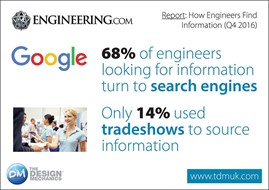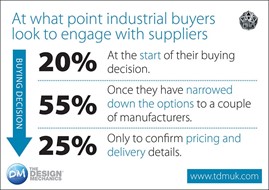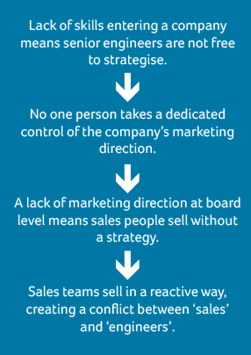Why are so many manufacturers bad at marketing?
Author: Dave Pannell is Manufacturing Ambassador for CIM in Yorkshire and the creative force behind The Design Mechanics.
In this article Dave Pannell, Manufacturing Ambassador for CIM in Yorkshire, considers why many manufacturing companies are not embracing modern marketing methods. Dave is author of Marketing for Manufacturers which is available as a download.
Modern manufacturers and engineers know that just being good at making a product is not enough. Manufacturing companies are increasing their marketing spend year on year, but using the internet for sales and marketing (where an increasing majority of technical buyers now turn) still remains a low priority for many.
 In a recent survey by Engineering.com on how engineers and industrial buyers find information, almost 70% said that they now turn to search engines to find information. Only 14% said that they used tradeshows. In the same study, only 20% of industrial buyers said they wanted to engage with suppliers in the early stages of their buying decision. 55% wouldn’t want to contact a company until they had already narrowed the options down to a couple of manufacturers themselves, and 25% only to confirm the price and delivery options once they had already made their decision – without any prior contact with the supplier.
In a recent survey by Engineering.com on how engineers and industrial buyers find information, almost 70% said that they now turn to search engines to find information. Only 14% said that they used tradeshows. In the same study, only 20% of industrial buyers said they wanted to engage with suppliers in the early stages of their buying decision. 55% wouldn’t want to contact a company until they had already narrowed the options down to a couple of manufacturers themselves, and 25% only to confirm the price and delivery options once they had already made their decision – without any prior contact with the supplier.
With a customer completing so much of their buying decision online before contacting you, this gives your sales team little opportunity to ‘sell’ directly to a prospect. This is why digital marketing strategies that aim to engage these ‘invisible buyers’ early on in their buying decision (such as collecting a potential customer’s email address in return for letting them download information) have become so vital.
Even though manufacture rs know they need to get better at selling themselves (and it is undeniable that online, or ‘digital’ has to be a part of this), why is the industrial sector in general so bad at it?
rs know they need to get better at selling themselves (and it is undeniable that online, or ‘digital’ has to be a part of this), why is the industrial sector in general so bad at it?
The main challenge that manufacturing companies have with marketing is not because the company has a technical sell, or a hard to reach marketplace – instead it’s often down to the core culture of the business. Industrial companies in the UK currently employ an ageing and high-seniority workforce who can be change resistant, and a shortage of people entering the industry with the right trade skills means experienced engineers have less time to work on the strategy of the business because they are still needed in a hands-on capacity day-to-day.
In this situation, sales and marketing remain organic and unfocused, with no-one taking full strategic responsibility for the company’s marketing. Indeed, few industrial companies employ a marketing manager even when they get to the size where, in any other industry, the company would have a full in-house marketing team.
This lack of strategic marketing direction at board level means sales people are not led by a wider strategy. This creates even more conflict as sales teams sell in a reactive way: promising what the engineers cannot easily deliver, or chasing work that has become unprofitable or undesirable to the company.
A fundamental marketing strategy can enable a company to increase sales without expanding their sales force – focusing the right marketing message on the customers who are most likely to buy, or who are most profitable. But introducing this level of strategic thinking is usually the result of partnering with outside expertise, such as a marketing consultant or agency, and this is where another area of conflict lies. The cultural differences between many marketing consultants and manufacturing organisations are tangible. Engineers believe that marketers will never fully understand manufacturing operations or their niche specialist marketplace.
Engineers can also be technically unsavvy and reject many fundamental modern marketing concepts though lack of experience of them; for example, arguing that they see email marketing as ‘spam’, or that they are not on LinkedIn themselves so their customers will think and act the same as they do.
The reality though is that if a manufacturing company is not embracing modern marketing methods, it will be losing market share every single quarter to the competitor who is. In the same way that computer-aided design revolutionised engineering, computer-aided sales and marketing is doing the same for lead generation.